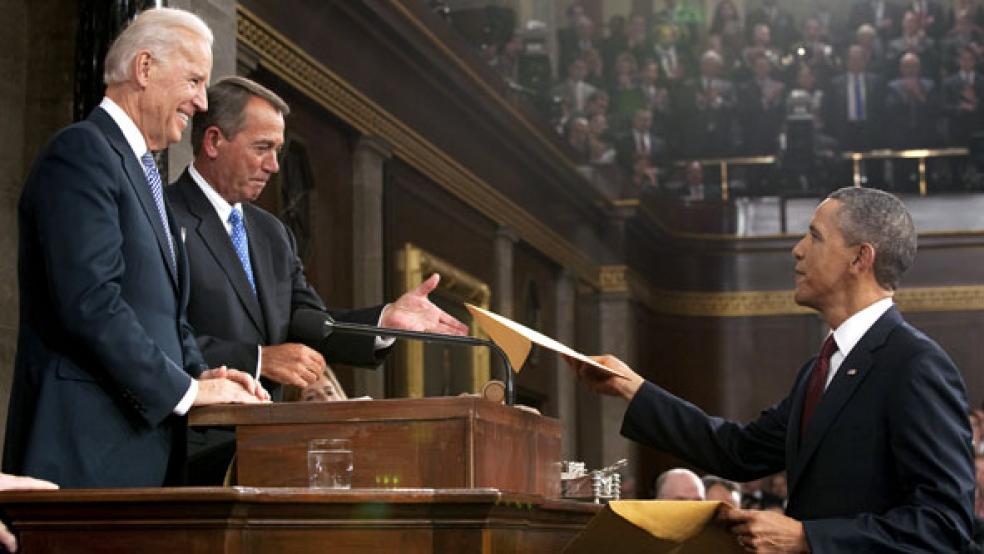President Obama’s State of the Union speech Tuesday night outlined a series of measures to reinforce the economic recovery and begin to close the income gap between the rich and the rest of Americans. Yet most of his ideas are likely to end up more as campaign slogans this fall than legislative realities.
“Overall, it was a classic State of the Union speech, full of poll-tested mini-ideas and cotton-candy rhetoric,” said Larry Sabato, a University of Virginia political scientist.
A few of his proposals, especially those dealing with unemployment benefits and tax relief for the middle class, are political no-brainers and are certain to be approved by Congress before it adjourns for the fall election. Others, dealing with trade and clean energy promotion, can be handled by executive action, without the help of Congress.
But with the White House and congressional Republicans locked in a stalemate over the economy, jobs, taxes, energy issues and immigration, it is unlikely there will be much more accomplished before Congress finishes for the year, according to some Capitol Hill Democrats and Republicans.
The president for months has been charting a course independent of his adversaries on Capitol Hill, and he can be expected to continue to campaign against a “do-nothing” Congress that is suffering from rock-bottom public approval. “The state of our Union is getting stronger . . . [and] as long as I’m President, I will work with anyone in this chamber to build on this momentum,” Obama told the joint session of Congress last night. “But I intend to fight obstruction with action, and I will oppose any effort to return to the very same policies that brought on this economic crisis in the first place.”
The president’s blueprint for “An America Built to Last” contains dozens of ideas and proposals that we’re likely to hear more about as the 2012 campaign heats up. But most of them will end up on the legislative backburner or be shelved altogether. Here is a summary of the major proposals, and how they are likely to end up:
Proposals certain to be adopted or enacted this year:
- • Extend the payroll tax cut and unemployment for rest of year. The White House and congressional leaders area on record in support of extending these benefits beyond the current Feb. 30 cutoff – a must-do for lawmakers in a critical election year.
• Create a trade enforcement unit that will bring together resources and investigators from across the federal government to go after unfair trade practices in China and other countries around the world. The government would also step up trade inspections to stop counterfeit, pirated or unsafe goods before they enter the United States. (Obama has ordered this.)
• Promote clean energy policies by ordering the Navy Department to make the largest renewable energy purchase in history – one gigawatt – and by directing the Interior Department to permit 10 gigawatts of renewable energy projects on public lands by the end of the year, enough to power three million homes.
• Create a Financial Crimes Unit within the Justice Department to go after large-scale financial fraud so that Americans’ investments are protected. (Obama has ordered this.)
• An executive order to clear away the red tape on many construction projects.
Ideas that will get some attention but little else:
- • Obama’s challenge to states to require students to stay in school until they graduate or turn 18 years of age.
• Eliminate tax deductions that companies receive for the cost of shutting down factories and moving production overseas, and create a new tax credit to cover moving expenses for companies that close production overseas and bring jobs back to the United States. Also, a new tax credit that provides support for companies seeking to finance new factories, equipment or production in communities that have been hardest hit by a company choosing to relocate or a military base shutting down.
• Put veterans to work protecting communities and preserving natural resources through creation of a Veterans Job Corps.
• Streamline and reform outdated and inefficient unemployment insurance to help put more Americans back to work. The unemployment insurance program would be reformed by requiring workers to undergo eligibility assessments in order to receive emergency federal benefits, while at the same time offering new tools to help workers find work.
Ideas going nowhere this year:
- • Passage of Obama’s proposal that millionaires should pay an effective tax rate of at least 30 percent on their income —a sort of alternative minimum tax. This is in line with the so-called “Buffett Rule” that no household making over $1 million a year should pay a smaller share of its income in taxes than middle-class families pay. Under current law, the wealthiest Americans technically pay a 35 percent rate on their income – but only 15 percent on earnings from investments and capital gains. While Obama did not detail how he would tax investment income,, he did say he would eliminate millionaires’ ability to claim tax deductions for housing, child care, retirement and health care.
• Use half the savings from ending foreign wars to create more jobs and make the U.S. more competitive.
• End Senate filibusters and obstruction of judicial and “public service” nominations. The Senate would have to pass a rule that all such nominations would receive a simple up or down vote after 90 days of submission.
• Immigration reform, including legislation that would give responsible, productive and law-abiding illegal immigrants a pathway to U.S. citizenship.
• Legislation that would ban insider trading by members of Congress. In the wake of a CBS News “60 Minutes” report on how some lawmakers have invested in industries they were overseeing, Obama urges passage of legislation that clarifies that members of Congress are subject to the same insider trading laws that apply to everyone else.
Michelle Hirsch of The Fiscal Times contributed to this report.





